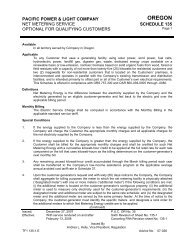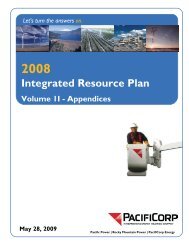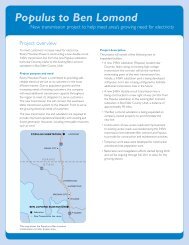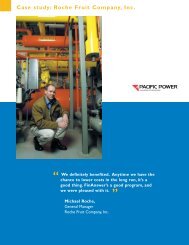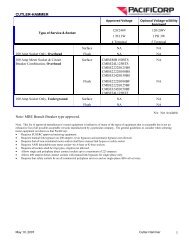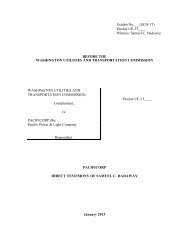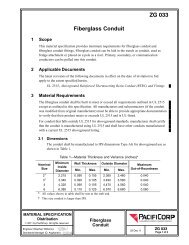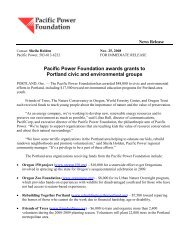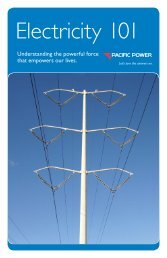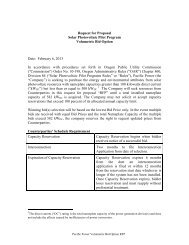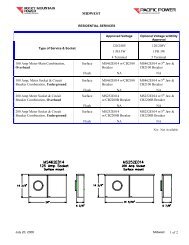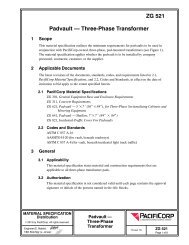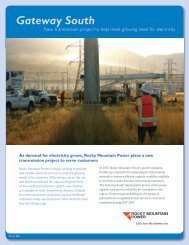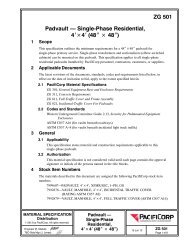Advice Filing - Pacific Power
Advice Filing - Pacific Power
Advice Filing - Pacific Power
You also want an ePaper? Increase the reach of your titles
YUMPU automatically turns print PDFs into web optimized ePapers that Google loves.
1 Commission's reasoning in the interconnection dockets strongly suggests that such third-<br />
2 party transmission costs should be assigned to the QF because they are the direct result of<br />
3 QF generation and are necessary to ensure that delivery of QF net output does not<br />
4 adversely impact safe and reliable system operations. 28 Under the Commission's<br />
5 reasoning set forth in AR 521 and UM 1401, the QF should be responsible for the costs<br />
6 of third-party transmission because such costs address safety and reliability impacts<br />
7 caused by the QF's decision to deliver excess generation to a load pocket.<br />
8<br />
9<br />
10<br />
c. Requiring PacifiCorp to pay third-party transmission costs made necessary<br />
by QFs receiving the Schedule 37 rate would violate PURP A.<br />
It is well settled that PURP A prohibits the Commission from requiring a utility to<br />
11 pay more than its full-avoided cost to purchase electricity from a QF. 29 Whether<br />
12 requiring a utility to pay Schedule 37 avoided cost rates and to pay for third-party<br />
13 transmission necessary to fully use net output violates PURP A is a matter of first<br />
14 impression in Oregon. However, in substantially analogous circumstances, California<br />
15 has determined that a standard rate QF contract violates PURP A if it is systematically<br />
with PacifiCorp Transmission. As a result, the allocation of such costs must take place in an<br />
agreement to which both PacifiCorp Merchant and the QF are parties.<br />
28 When a QF delivering output to a load pocket is designated as a network resource, PacifiCorp<br />
Transmission identifies whether the addition of the QF generation in the load pocket could result in<br />
more local generation than local load. Any excess generation in a load pocket would cause safety and<br />
reliability concerns which PacifiCorp must mitigate. However, because PacifiCorp lacks the right to<br />
curtail output under a Schedule 37 PPA, PacifiCorp merchant must move the excess generation out of<br />
the load pocket by purchasing third-party transmission. Aff. Desmarais, 1f 6.<br />
29 American Paper Inst. v. American Elec. <strong>Power</strong>, 461 U.S. 402, 413 (1983) (affirming that a utility's<br />
full-avoided cost is the "maximum rate that the Commission may prescribe."); So. Cal. Edison Co. v.<br />
Pub. Util. Comm'n. o/Cal., 101 Cal. App. 4th 384,398 (2002) (Edison I). A corollary to this prohibition<br />
is that a utility cannot be compelled to enter into a QF contract at prices that exceed its avoided cost.<br />
So. Cal. Edison Co., et ai., 70 FERC 1f 61,215, 61,677 (1995)("Because the California Commission's<br />
procedure was unlawful under PURPA, Edison and San Diego cannot lawfully be compelled to enter<br />
into contracts resulting from that procedure.").<br />
PacifiCorp's Memorandum of Law in Support of <strong>Advice</strong> No. 11-011 11



